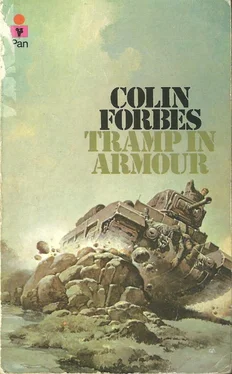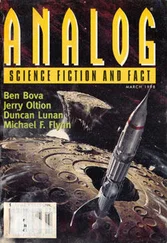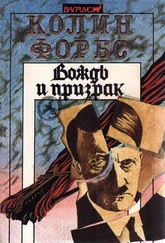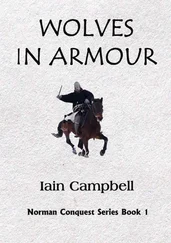Колин Форбс - Tramp in Armour
Здесь есть возможность читать онлайн «Колин Форбс - Tramp in Armour» весь текст электронной книги совершенно бесплатно (целиком полную версию без сокращений). В некоторых случаях можно слушать аудио, скачать через торрент в формате fb2 и присутствует краткое содержание. Город: London, Год выпуска: 1971, ISBN: 1971, Издательство: Pan Books, Жанр: Триллер, Историческая проза, prose_military, на английском языке. Описание произведения, (предисловие) а так же отзывы посетителей доступны на портале библиотеки ЛибКат.
- Название:Tramp in Armour
- Автор:
- Издательство:Pan Books
- Жанр:
- Год:1971
- Город:London
- ISBN:0-330-02686-0
- Рейтинг книги:3 / 5. Голосов: 1
-
Избранное:Добавить в избранное
- Отзывы:
-
Ваша оценка:
- 60
- 1
- 2
- 3
- 4
- 5
Tramp in Armour: краткое содержание, описание и аннотация
Предлагаем к чтению аннотацию, описание, краткое содержание или предисловие (зависит от того, что написал сам автор книги «Tramp in Armour»). Если вы не нашли необходимую информацию о книге — напишите в комментариях, мы постараемся отыскать её.
Tramp in Armour — читать онлайн бесплатно полную книгу (весь текст) целиком
Ниже представлен текст книги, разбитый по страницам. Система сохранения места последней прочитанной страницы, позволяет с удобством читать онлайн бесплатно книгу «Tramp in Armour», без необходимости каждый раз заново искать на чём Вы остановились. Поставьте закладку, и сможете в любой момент перейти на страницу, на которой закончили чтение.
Интервал:
Закладка:
This time he was going to swim the distance in two stages, pausing halfway along the stretch under the lee of the bank where long grasses trailed into the water. In fact, swimming as he was now against the current, he was going to have to take two bites at the cherry, a favourite Penn phrase for seeing the same girl twice. His face close to the flat-rocked bed, he was having to swim all-out to make headway against the current which was stronger than he had expected; he began to veer in close to the bank, expelling air slowly, bis eyes gazing ahead for underwater boulders as soft mushy weeds brushed against his face unpleasantly. When he reached the bank and surfaced behind the trailing grasses he found that he had covered half the distance. He stood crouched against the bank, his nose just above the water, watching the approach of yet another German tank, and it was rather like observing it through a green bead curtain, his first close-up look at the weapon which was sweeping across the plains of France in an annihilating wave.
As he waited hunched under the bank his mind raced over the problems ahead: taking Bert downstream when the coast was clear was something they might just manage in this depth, and beyond the bridge he could leave the river where the banks came lower, a fact he had observed from under the bridge. The tank was crossing now, the commander leaning out of the turret to check clearance. Once we get away from this lot, Barnes thought, we’ll head west-south-west: in spite of Seft’s deception he was confident that he had a rough idea of where they were because he had found two places on the map which could correspond to the fictitious Fontaine. And west-southwest should lead in the general direction of Arras. The tank had crossed now. He slipped under the water.
He was immediately aware that his movements were slower, that his strokes lacked thrust, so he redoubled his efforts, determined that this time he must get round that bend or else he was going to be spotted. He had pushed his luck to the limit and far beyond, so whatever happens, keep going, he told himself, for God’s sake keep going. In his anxiety to succeed he took a short cut, veering to the left to take himself straight for the turn in the river, seeing a forest of trailing weeds ahead and projecting himself through the diabolical mess. He was almost through when he felt a tug above his right kneecap, the one he had injured, and when he endeavoured to swim forward he remained anchored to the spot where the weeds had twined themselves round him. Pausing for a split second, he lunged out savagely, felt the weed stranglehold tighten, and he didn’t move forward an inch. He was running out of air: the only thing to do was to surface. He made to swim up and the grip tightened like the tentacles of an octopus. You can’t drown in four feet of water, Barnes. But you can, you know – if your upper leg is locked down tight close to the bed. A tremble ran through his brain and transferred itself to his body as he felt panic rising. Grimly, he fought down the emotion and concentrated on freeing his damned leg. Think it out, quickly! Forward is no use – try sideways, out into mid-stream. His lungs were protesting again, building up a horrible balloon-like pressure, the water gyrating fiddly, a singing in his ears growing. He thrust out sideways, felt the weed tighten. God, he really was done for this time. Keep moving, Barnes! He made one last effort, felt the weed tearing away as though reluctant to give up its victim, then he was free, stroking his way upstream, still under water until he came to the surface choking and spluttering as he gulped in water, his head turning automatically to check his position. He was round the bend.
And if it goes on like this much longer he thought as he headed for the bank, we’ll all be round the bend. But his instinct told him that it would probably get worse.
Eight and a half hours later, at three o’clock in the afternoon and thirty miles away from the bridges, the tank was like a hunted animal, still alive but only because of the sharp eye and keen instinct for danger of its controller who had saved it on four separate occasions from detection by the hunters. At the same time the animal was still viciously armed with over seventy two-pounder shells and ten boxes of Besa ammunition secreted within its innards.
By 8.30 am the Panzers had gone from the river area and by 9 am the tank crew had shaved – at Barnes’ insistence -and they had eaten bully beef and the last of the French bread Seft had brought, which reduced their rations to a meagre quantity of remaining bully beef and nothing else: the two tins of meat Seft had supplied were found to be blown, whether by accident or on purpose didn’t matter any more, but it did mean that they were desperately short of food. They were also running low on water but this was due to an accident and an oversight which were the result of chance and fatigue-Before leaving the river they had attended to the radiator and filled a dixie with water for their own use: the accident had taken place an hour later when they mounted a steep bank into a wood to escape being spotted by a flight of Stuka bombers. The dixie had. fallen over and spilt its precious contents on the turntable floor. The oversight was the fact that only Barnes had remembered to fill his water-bottle – he blamed himself for not checking to make sure that the others had filled their own. In a word, there was now one water-bottle to quench the growing thirst of three men. Although only briefly mentioned, the thirst was the reason for a bitter argument between Barnes and Penn soon after one o’clock.
‘I think we ought to risk going in,’ Penn had said emphatically, pointing towards the town on the skyline.
‘We’ll go round it, instead – across country,’ Barnes had replied quietly.
Across the sun-baked fields, the town – another church spire and a line of buildings – had looked like a mirage as it trembled gently in the dazzling heat haze, an impression heightened by the absence of workers in the fields, although normally the farmers would have been busy at this time of the year. This absence of people troubled Barnes and strengthened his decision.
‘It is possible to get a bit too cautious,’ said Penn hotly.
‘It’s also possible to walk into something we won’t get out of. There’s no one about and I don’t like the smell of it.’
‘There’s been no one about for miles – what makes this place so ruddy different?’
‘The fact that there’s a town over there. If it’s under German occupation the locals may be lying low indoors – these are cultivated fields so there should be someone working them.’ Barnes put a foot on the hull to climb back into the tank. ‘Any more questions before we start?’
‘We’ve seen no sign of Jerry on the ground since we left the river – what makes you think he’s anywhere near here?’
‘Penn, I’ve no idea where Jerry is. From what I’ve seen and from what you told me about those radio bulletins my guess is that the Germans have torn a huge gap in the Allied lines which may be up to twenty miles wide [2] Barnes had badly underestimated the position: at this moment the gap torn in the Allied lines by the Wehrmacht was between fifty and sixty miles wide.
– at the moment we’re somewhere inside that gap but until I know more about it we’ll avoid all towns and villages as long as we can. We’re moving off now.’
Two hours later they were moving along a deserted country road under the furnace blaze of the afternoon sun, and during those two long hours they had stopped three times to avoid detection by aircraft, halting twice in the lee of hedges and sheltering once inside an abandoned dairy farm where they had been surrounded by empty milk churns. As they had waited for the Stuka bombers to disappear a small herd of cows had gathered behind a fence, their udders horribly swollen, their strange cries a pathetic sound which had affected them more than the distant roar of the Stuka engines. But there was no one to milk the beasts so they had gone away, thankful when Bert’s engines drowned the echoes of animal pain. It was not only people who were suffering in this war, Barnes had thought.
Читать дальшеИнтервал:
Закладка:
Похожие книги на «Tramp in Armour»
Представляем Вашему вниманию похожие книги на «Tramp in Armour» списком для выбора. Мы отобрали схожую по названию и смыслу литературу в надежде предоставить читателям больше вариантов отыскать новые, интересные, ещё непрочитанные произведения.
Обсуждение, отзывы о книге «Tramp in Armour» и просто собственные мнения читателей. Оставьте ваши комментарии, напишите, что Вы думаете о произведении, его смысле или главных героях. Укажите что конкретно понравилось, а что нет, и почему Вы так считаете.








![Невилл Форбс - История Балкан [Болгария, Сербия, Греция, Румыния, Турция от становления государства до Первой мировой войны] [litres]](/books/390301/nevill-forbs-istoriya-balkan-bolgariya-serbiya-gre-thumb.webp)


